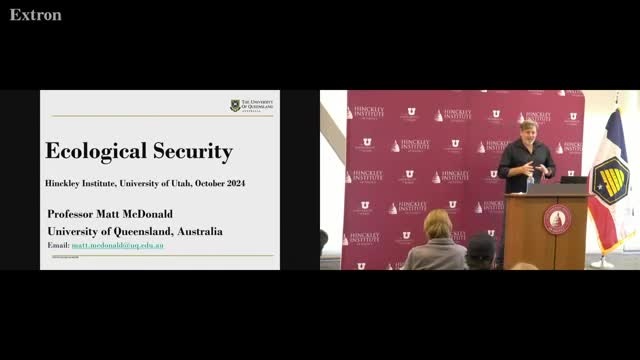Indigenous wisdom reshapes environmental stewardship debate
October 03, 2024 | Hinckley Institute of Politics, Utah Lobbyist / NGO, Utah Legislative Branch, Utah
This article was created by AI summarizing key points discussed. AI makes mistakes, so for full details and context, please refer to the video of the full meeting. Please report any errors so we can fix them. Report an error »

During a recent government meeting, a speaker emphasized the importance of acknowledging Indigenous communities in discussions about environmental change, particularly in the context of Brisbane, which is set to host the 2032 Olympics. The speaker highlighted the need to recognize the traditional owners of the land, specifically the Jagera and Turrbal peoples, and to honor their elders—past, present, and emerging.
This acknowledgment is not merely ceremonial; it serves to confront the historical injustices faced by Indigenous populations, including colonization and dispossession. The speaker argued that understanding these historical contexts is crucial when addressing contemporary environmental issues, as many drivers of environmental change stem from the relationship societies have with nature.
In collaboration with a colleague, the speaker is working on a paper that compares Indigenous approaches to fire management with national strategies. They noted a significant contrast between the Western notion of separation between humanity and nature and the holistic perspectives held by Indigenous cultures worldwide. This relational understanding of the environment, they argued, is essential for effective environmental stewardship and has been largely overlooked in settler colonial societies.
The discussion underscored the need for a paradigm shift in how environmental issues are approached, advocating for a deeper integration of Indigenous knowledge and practices in contemporary environmental management strategies.
This acknowledgment is not merely ceremonial; it serves to confront the historical injustices faced by Indigenous populations, including colonization and dispossession. The speaker argued that understanding these historical contexts is crucial when addressing contemporary environmental issues, as many drivers of environmental change stem from the relationship societies have with nature.
In collaboration with a colleague, the speaker is working on a paper that compares Indigenous approaches to fire management with national strategies. They noted a significant contrast between the Western notion of separation between humanity and nature and the holistic perspectives held by Indigenous cultures worldwide. This relational understanding of the environment, they argued, is essential for effective environmental stewardship and has been largely overlooked in settler colonial societies.
The discussion underscored the need for a paradigm shift in how environmental issues are approached, advocating for a deeper integration of Indigenous knowledge and practices in contemporary environmental management strategies.
Don't Miss a Word: See the Full Meeting!
Go beyond summaries. Unlock every video, transcript, and key insight with a Founder Membership.
✓
Get instant access to full meeting videos
✓
Search and clip any phrase from complete transcripts
✓
Receive AI-powered summaries & custom alerts
✓
Enjoy lifetime, unrestricted access to government data
30-day money-back guarantee

